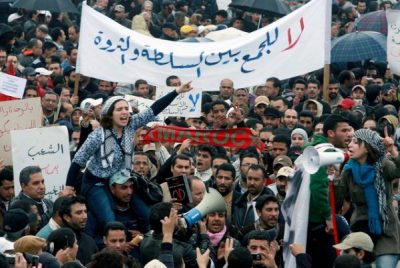By
Anant Mishra
Many nations in the MENA (Middle East and North Africa) region have long histories of authoritarian government. In fact, Muslim countries—a category into which many states in this region fall—constituted 55% of the world’s undemocratic nations in 2005.
This pattern of authoritarian rule was disrupted in December 2010, however, when the self-immolation of Mohamed Bouazizi set off a string of protests against the general quality of life in Tunisia and President Zine al-Abidine Ben Ali, who had ruled for twenty-three years, was forced to step down. Protests quickly spread across the entire region, and this rapid democratization came to be known as the Arab Spring.While these populist revolutions have experienced different degrees of success in different nations, all of them have involved a radical alteration in national policy (and often regime), and many countries are beginning the process of rebuilding themselves according to the democratic model. Education reform is central to this process, and it is the duty of UNESCO to assist these nations that have experienced (and are still experiencing) violent internal conflict with the rebuilding of their shattered educational systems.
The Arab Spring
The populist revolutions that have swept across the MENA region these past two years have taken very different forms and experienced very different degrees of success in individual nations. While a series of protests took place in Bahrain in February 2011, the government quickly suppressed this movement with the help of troops from Saudi Arabia and the country has benefitted little from the Arab Spring. In contrast, Yemen experienced a series of violent uprisings in January 2011 and had elected a new president—former Vice President Abed Rabbo Mansour Hadi—by February, though former President Abdullah Saleh still retains quite a bit of influence in the country. Tunisia—the origin of the Arab Spring uprisings—ousted its president of twenty-three years, Zine al-Abidine Ben Ali, by January and hosted its first free elections only nine months later. The longest and most intense conflicts, however, took place in Egypt, Libya, and Syria, and the conflict in Syria has yet to be resolved.
The uprising in Egypt against President Hosni Mubarak began in January 2011 and was inspired by the protests in Tunisia, the rigged elections of 2010, and a general dissatisfaction with Mubarak’s authoritarianism. A series of popular protests centred in Cairo ultimately culminated in a military coup, and although popular elections were held in June 2012, the Supreme Council of the Armed Forces—Egypt’s transitional government—stripped the office of the president of many of its powers before the newly elected Mohamed Morsi of the Muslim Brotherhood could take office. More recently, protests have taken place against what has been perceived as the concretization of the Egyptian government, as the body charged with drafting a new constitution is heavily dominated by Islamists.
The conflict in Libya began in February 2011 and rapidly escalated into what might be termed a civil war. While the government was officially toppled on 23 August 2011 and Colonel Muammar Gaddafi was killed almost exactly two months later, effectively destroying the government resistance, militias retained fragmentary control of the country even after the National Transitional Council officially took power due to the disorganized nature of the revolution. Though elections for the General National Congress were successfully held in June 2012, the nation is faced with the difficult process of building a democratic nation after decades of authoritarian control.
Syria is still in the midst of a conflict that is becoming ever more violent and sectarian. The revolution in Syria began in March 2011 and took longer to gain momentum largely due to President Bashar Assad’s vacillating policy of belated reform and violent suppression. The international community was slow to engage in the conflict, and the peace plan drafted by Kofi Annan as the UN and Arab League Joint Special Envoy was largely a failure. Sectarianism and fundamentalist Islam have begun to affect the resistance, and the number of civilians killed or displaced by the violence is steadily growing.
MENA Educational Policies
In the years before the Arab Spring uprisings, the nations of the MENA region had widely varying educational policies. In 2003, Syria, Egypt, and Tunisia had enrolment rates at the level of primary education of over 90%, while Yemen’s enrolment rate was below 70%. The rates of enrolment at the level of secondary education were less impressive, and Syria and Tunisia were the only nations with rates at or above 80%. All of these nations have exhibited significant disparities in access to education between genders and social classes, though Yemen exhibited the greatest disparity in 2003. The educational policies of the nations involved in the Arab Spring have had to change drastically since the beginning of the revolutions due to changes in the availability of both material and intellectual resources. From a material perspective, the educational systems of these nations have been devastated. Schools have been appropriated by military groups in both Syria and Libya, and many schools have been destroyed either due to their occupation by military force or as victims of collateral damage. While refugee camps such as the Zaatari camp in Lebanon have attempted to provide displaced Syrian children with access to education and the sense of normalcy associated with the daily attendance of school, they do not have the resources to accommodate an ever-increasing number of refugee children, and according to the Associated Press, “at least 200,000 Syrian children displaced inside their country are having difficulty accessing education”. In areas that are still experiencing conflict (such as Syria), children’s opportunities to attend school are very limited, and opportunities for them to receive a quality education are even more limited.
The problems facing nations in which conflict has largely ceased are less concerned with material resources and more concerned with the reform of educational and political ideology. While Libya’s rebuilding process will involve the repair of schools damaged in the conflict, it lacked an adequate amount of schools before the fighting even began, as Gaddafi ordered a halt to the construction of schools from the late 1980s until 2010. Under Gaddafi’s rule, his own political manifesto known as The Green Book was required reading, and Sub-Saharan African languages like Hausa and Swahili were taught instead of more globally useful languages. Teachers were hired based on their loyalty to the regime, and the emphasis of Libyan education was placed on obedience rather than critical thinking. While the process of education reform has begun with the preliminary re-training of teachers in both practical matters (such as the avoidance of landmines) and new pedagogical techniques, UNESCO has called for a comprehensive review of Libya’s textbooks and curriculum concerning history, civic education, and Arabic.
Because education is central to the reproduction of a national culture, the tendencies toward religious fundamentalism and authoritarianism that have reappeared in some Arab Spring nations are objects of concern for many citizens. In Libya, many of the young rural poor remained loyal to the Gadaffi regime even after it had been toppled and Gadaffi had been killed. In October 2012, controversy erupted around a teacher in southern Egypt who cut the hair of two students “as punishment for not wearing Muslim headscarves”, and many are concerned that this—in conjunction with the election of Mohammed Morsi and the drafting of the new constitution by a predominantly Muslim body—gestures toward the imminent institution of a theocratic regime. Even Tunisia—where the revolution was relatively peaceful and successful—has had difficulties with its ideological transition, and the burning of the American school in Tunis (although motivated by broader anti-American sentiments) suggests a certain resistance to the West’s version of education.
UNESCO’s Role
UNESCO is deeply invested in the reform of the educational policies of all nations transitioning from authoritarian rule to democratic rule. In the case of Libya, it has called for “two new ministries (a Ministry of Education and a Ministry of Higher Education and Scientific Research) …to prepare brief strategic plans…for immediate or short-term objectives” such as the “maintenance of schools damaged during the 2011 upheavals” and the accommodation of “children of displaced families in schools in their original areas of residence”. Although Libya’s reforms will necessarily be larger and more sweeping than the reforms of some other countries affected by the Arab Spring, the same ideological approach—one that engages the new or transitional government while safeguarding the rights of children—can and should be applied to the other nations that have been recently (or are in the process of being) democratized.



No Comments Yet!
You can be first to comment this post!